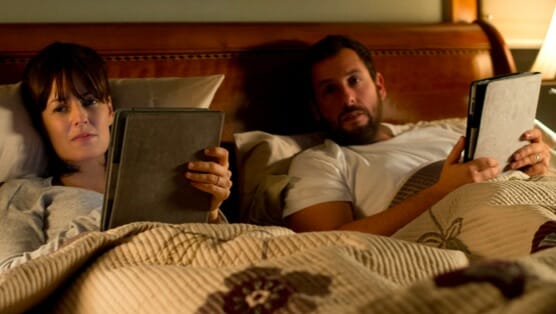Men, Women & Children

Men, Women & Children is director Jason Reitman’s version of a morality play, a warning that technology is luring society—particularly, white middle-class America—down the road to depravity. Based on the 2011 novel by Chad Kultgen, the film touches on themes Reitman has explored previously, from loneliness and infidelity in Up in the Air to the feminist leanings of Juno, in which women are as in control of their (sex) lives as men. While Men, Women & Children is a beautifully shot, elegiac work with a terrific ensemble cast, the film ultimately misconnects, hampered by simplistic, surface characterizations and heavy-handed sermonizing.
An omniscient narrator (Emma Thompson) introduces the characters through their various internet predilections. Of course there are porn addicts in this Texas town, but there are also references to massively multiplayer online role-playing games (MMORPGs); the Ashley Madison dating site (for those already in relationships); online alter egos; and “pro-ana”/“pro-ED” online groups (pro-anorexia/pro-eating disorders). Thompson’s character interludes lend a fable-like tone to the film, but the narration during multiple instances of the Voyager spacecraft hurtling through space—à la Gravity—and references to Carl Sagan’s Pale Blue Dot are distracting. The audience doesn’t need to be reminded how insignificant their lives really are in the universe’s grand scheme.
In Reitman’s onscreen world, the preferred method of communication is text message, email, or chat—anything but physical conversation between friends and families—a point that’s reiterated ad nauseam. He frames shots of crowds on the streets or in schools, with people focused only on their phones, never looking up. The use of pop-up bubbles and text to illustrate conversations is fitting, as we’re accustomed to onscreen graphics littering our TV and computer screens. Reitman and co-writer Erin Cressida Wilson use this device carefully, ensuring the visuals replace or enhance the dialogue—as when two girls text each other running commentary during a conversation with a third girl whom they detest. Adding layers to this already depressing, tech-dependent world is Reitman’s use of moody, darker colors, often pierced by the illumination from cell phone or computer screens.
A welcomely subdued Adam Sandler portrays porn-addicted Don Truby, trapped in a staid marriage with Helen (Rosemarie DeWitt). The cues to the Trubys’ troubles are obvious; they schedule time for or altogether put off sex and play online Scrabble on iPads next to each other in bed. Rather than talk about their relationship, Don hires an escort for help, while Helen turns to Ashley Madison—and a wild dalliance with Dennis Haysbert’s “Secretluvur,” among others—for comfort. As if their need for emotional and physical intimacy weren’t obvious enough, Don asks his escort to cuddle for the last 30 minutes of their session.
Don’s son Chris (Travis Tope) is a handsome but socially awkward high school football player. He’s only sexually aroused by hardcore fetish pornography and finds himself in a bind when pursued by cheerleader Hannah Clint (Olivia Crocicchia). Hannah harbors her own secrets; she dreams of stardom and the Hollywood lifestyle, things that eluded her mother (Judy Greer) years earlier. Since acting lessons aren’t cheap, Hannah and her mother set up a personal modeling website on which visitors can pay for special request photos. Greer is a standout in her role, somehow able to elicit a modicum of sympathy for a mom who’s obviously pimping out her daughter to strangers.